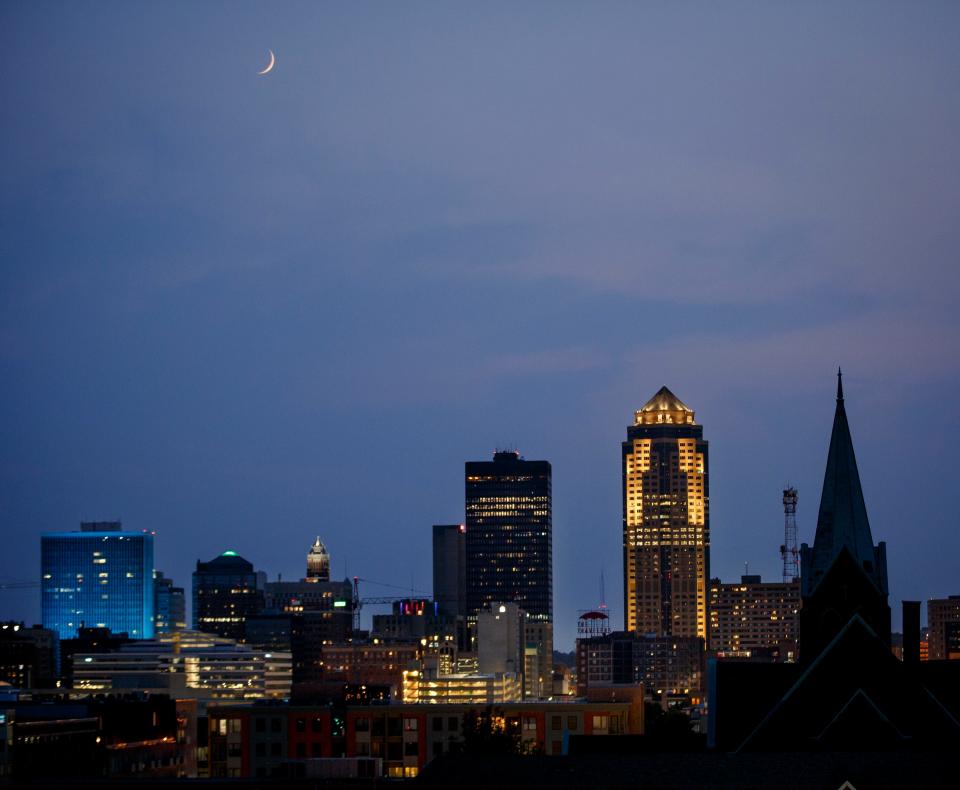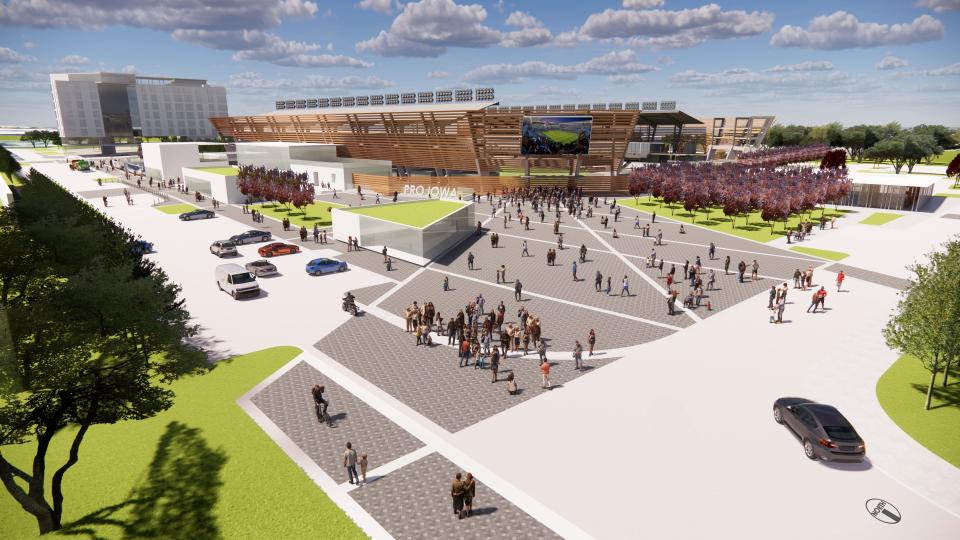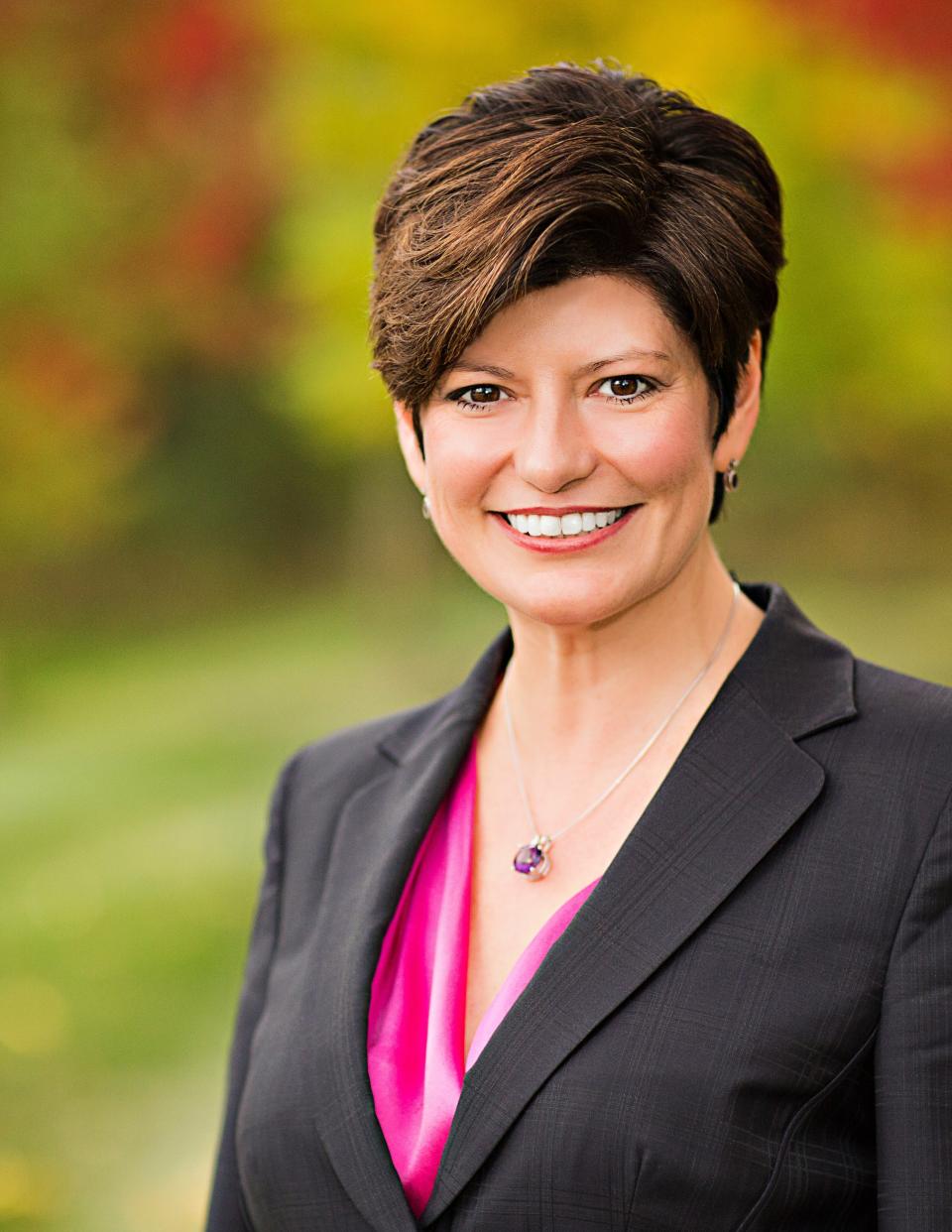How Des Moines leaders plan to help with the worker shortage and revive downtown
As foot traffic in downtown Des Moines dwindled during the coronavirus pandemic, city leaders took the pause as an opportunity to plan.
The Greater Des Moines Partnership expects in 2022 to release the results of its 10-year vision and action plan for downtown Des Moines, identifying ways the city core can recover and thrive.
It's among the Partnership's top priorities for the new year. Iowa's largest economic and community development organization unveiled its 2022 agenda Thursday evening at the group's annual kickoff event at the Iowa Events Center.
Former pro soccer player Mia Hamm, a two-time FIFA Women's World Cup champion and two-time Olympic gold medalist, was the keynote speaker. Her attendance helped to highlight the announcement at the event that Des Moines had won a second-tier men's professional soccer franchise that will begin play in new downtown stadium in 2024.
More: USL Championship awards long-sought pro soccer franchise to Des Moines' Krause Group
The Partnership's priorities also include attracting skilled workers from outside the United States, increasing the diversity of the metro's workforce, and securing funding for a new terminal at Des Moines International Airport, along with other "placemaking" projects.

Partnership leaders said they hope to build on the successes of 2021, notably the opening of the nation's largest skatepark on the Des Moines riverfront and clearing the city's most notorious Superfund site. The former Dico factory tract on downtown's southwestern edge will be home to the new soccer stadium and accompanying development.
The group also is completing a study on broadband needs in central Iowa and celebrating 18 company expansions, said Fred Buie, 2021 Partnership chair.
More than 62 projects were announced, under construction or completed in central Iowa in 2021, representing $3.41 billion in capital investment, 11 million square feet of space and more than 3,600 new or retained jobs, according to the Partnership.
"During a COVID year that's pretty significant," Buie said. "So we're pretty pleased with that."
Here's a closer look at the Partnership's priorities for 2022.
Help downtown Des Moines thrive
With employees working remotely, many offices in downtown Des Moines been largely empty during the pandemic. Major employers have pushed back their return-to-office plans during the surge of the delta and omicron COVID-19 variants.
The Partnership hopes to help downtown Des Moines weather the storm by gathering data on why people like to come to the city's core, said Tiffany Tauscheck, chief operations officer. A focused study will identify "the motivators to draw people downtown," building on what already is successful, like the Des Moines Downtown Farmers' Market, she said.
There were times in summer 2021 that there were more people gathered for events downtown there before the pandemic, Tauscheck said.
"We want to keep contributing to that," she said.
More: 10 things to watch for in downtown Des Moines in 2022: Breweries, housing, a water trails project
The Partnership also plans to wrap up its Downtown DSM: Future Forward strategic plan in the spring. The plan "will be key in helping us identify specific actions we can take to contribute to short-term economic vitality and long-term growth" downtown, Tauscheck said.
Additionally, the Partnership will continue to be an advocate for what it calls "placemaking amenities" that enhance downtown, specifically:
The ICON Water Trails project, which will adapt 150 miles of central Iowa waterways for recreational use. Organizers expect to break ground on the first downtown project this year, creating a whitewater passage at the Scott Avenue dam.
The planned 6,300-seat soccer stadium and adjacent Global Plaza for year-round events at the former Dico site. Construction is expected to start this year.
Beyond downtown, the Partnership plans to work with regional planning entity Capital Crossroads on its third regional visioning plan. Capital Crossroads 3.0 will be the new strategy for central Iowa, updating the 2.0 plan released five years ago.

Continue work with employers on diversity, equity and inclusion efforts
Following through on its CEO Commitment to Racial Equity in DSM and subsequent roundtable discussions with Des Moines business leaders, the Partnership plans to start helping recruit a more diverse workforce.
The pledge was signed by 220 CEOs of Des Moines metro businesses, Buie said. First released in 2020, the seven-point pledge focuses on increasing workplace and community equality. Signers commit to recruiting and hiring more diverse employees and leadership, investing in inclusive workplace training and using their power to advocate for political change.
Incoming chair Rowena Crosbie said the Partnership must now focus its efforts on helping executives implement change by assisting companies with strategic priorities and offering diversity, equity and inclusion training to members and investors.
"The intention is there," she said. "The Partnership is going to be the partner to employers so they can turn those visions into reality."
Another Partnership goal is to increase the number of minority- and immigrant-owned businesses in Des Moines. It plans to release more information soon.

"We know that they drive growth, create jobs and make Des Moines a more welcoming place," said Crosbie, an immigrant from Canada and president of Tero International, a corporate training company she founded in 1993.
Launch a national talent attraction campaign and prepare future workers
To help employers with labor shortages, the Partnership plans to expand its efforts to attract talented workers to Des Moines, starting with researching how best to connect with diverse job candidates, said Courtney Shaw, senior vice president of communications.
The Partnership hopes to bring a "global flavor" to its current campaign, drawing the international talent that "is so important for our growth," said CEO Jay Byers.
"The focus so far has been digital, so it will be broader and bigger than what we've done," Shaw added. "A lot of communities are looking for talent, so our goal is to be unique and different."
The Partnership also is continuing work on its Future Ready DSM 75 by 25 goal of ensuring 75% of working-age adults in central Iowa will have degrees, certificates or other post-secondary educational credentials by 2025. When the initiative started in 2008, 51% of adults met that threshold. In 2019, it was 67%.
In 2022, the Partnership plans to develop an online dashboard that tracks the 75 by 25 goal and lists apprenticeships, internships and other work-based offerings. It also plans to launch an equitable program for obtaining credentials.
Secure funding for the airport
The Partnership hopes to play a major role in securing the remainder of the funding needed to build a new terminal at Des Moines International Airport.
The start of construction on the new terminal, set for 2026, could be accelerated by two years if the airport can close a $300 million funding gap with grants from central Iowa cities and counties, as well as the state, and secure funding from November's federal infrastructure bill.
The airport has nearly half of the $575 million needed to build the terminal and associated projects. It also recently sought $34 million from metro governments.
The Partnership will continue "identifying and securing" public funds, Crosbie said.
"It's going to take all of us to make that one happen," she said.
Kim Norvell covers growth and development for the Register. Reach her at knorvell@dmreg.com or 515-284-8259. Follow her on Twitter @KimNorvellDMR.
This article originally appeared on Des Moines Register: Greater Des Moines Partnership unveils priorities for 2022

